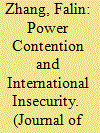|
|
|
Sort Order |
|
|
|
Items / Page
|
|
|
|
|
|
|
| Srl | Item |
| 1 |
ID:
153394


|
|
|
|
|
| Summary/Abstract |
A holism tendency in International Relations (IR) studies treats international systems and states as unitary wholes and thus leads to a tripartite view on China’s international role as either a revisionist, status quo or a pragmatist power. China’s stances in global financial governance (GFG), however, are inconsistent, which indicates that China is not a pure challenger or status quo power. These inconsistent stances do not allude to China being a pragmatist power, which makes policies and takes actions in a practical and matter-of-fact way without consistent national interests. Instead, China has inconsistent stances but consistent core national interests. The ostensible contradiction is due to the explanatory deficiency of the IR holistic tendency, which pays inadequate attention to fragmentations of international and domestic systems.
|
|
|
|
|
|
|
|
|
|
|
|
|
|
|
|
| 2 |
ID:
180464


|
|
|
|
|
| Summary/Abstract |
The China–US financial contention or confrontation comes to the fore, given the pivotal role of finance in the international system and the current international order transition. Will there be destructive conflicts or a Thucydides Trap in China–US financial relations? By adopting a power analysis framework, the China–US financial contention is observed from four types of international financial power: structural, relational, institutional and ideational. The competition for these powers results in reform divergence of global financial governance and thus international financial insecurity. The contention and consequent insecurity, however, do not necessarily mean an inevitable ‘Thucydides Trap’ in China–US financial relations. Elaborated and issue-specific ways of management could alleviate the contention, including shunning RMB-USD strategic confrontation, refraining from a debt weapon and aggressive imbalance adjustment, enhancing the legitimacy of international financial institutions and avoiding a new Cold War.
|
|
|
|
|
|
|
|
|
|
|
|
|
|
|
|
| 3 |
ID:
175063


|
|
|
|
|
| Summary/Abstract |
China’s exchange-rate regime reform policies have fluctuated since the early 1990s, experiencing at least six significant policy changes: 1994 unification, 1998 stabilization, 2005 reform, 2008 stagnation, 2010 relaunch and 2015 ‘8•11’ reform. This policy fluctuation plausibly suggests that China has behaved as a speculative pragmatist without being disciplined by established and consistent values, principles or national interests, particular against the backdrop of the current international power transition. Adopting an integrative Foreign Policy Analysis (FPA) analytical framework that differentiates and bridges International Relations (IR) national interests with FPA policy motivations, this article compares the six policy changes and argues that China has been a steadfast reformer rather than a speculative pragmatist since the early 1990s. Namely, the market-oriented exchange-rate regime reform has consistently reflected China’s national interest since the early 1990s, notwithstanding occasional policy fluctuations that diverge from the national interest. This integrative analysis contributes to transcending the ‘holism failure’ of IR studies by looking into the specific decision-making processes, and escaping from the ‘reductionist gamble’ of FPA studies by examining the long-term tendency and interests behind these apparently inconsistent policies.
|
|
|
|
|
|
|
|
|
|
|
|
|
|
|
|
| 4 |
ID:
175857


|
|
|
|
|
| Summary/Abstract |
Given the pivotal role of finance in interstate relations as a prominent source of international power, China–US financial competition, or even confrontation, could be more intense and devastating than trade conflict. It hence merits greater policy and academic attention and communication between the two states. This article takes stock of a triumvirate of Chinese views regarding China’s financial rise and potential China–US financial competition that has empirical and epistemological dimensions. Empirically, it signifies three major issue areas: Renminbi (RMB) strategies and dollar hegemony; the China–US financial imbalance and debt relations; and US dominance of global financial governance and ‘Zhongguo Fangan’—Chinese Solutions. RMB strategies to break dollar hegemony include a further three areas: International Monetary System reform; RMB internationalisation; and financial opening-up. Epistemologically, the empirical analyses present a triumvirate of embedded and interweaved angles: normative and universal; technical and micro level; and power and nationalist. Based on a triumvirate of perspectives, it argues that China’s financial rise is variously limited in relevant fields, and that China–US financial competition also varies according to different issue areas associated with different financial powers, and thus calls for a reductionist, field-specific, and pluralistic approach to managing China–US financial competition.
|
|
|
|
|
|
|
|
|
|
|
|
|
|
|
|
|
|
|
|
|